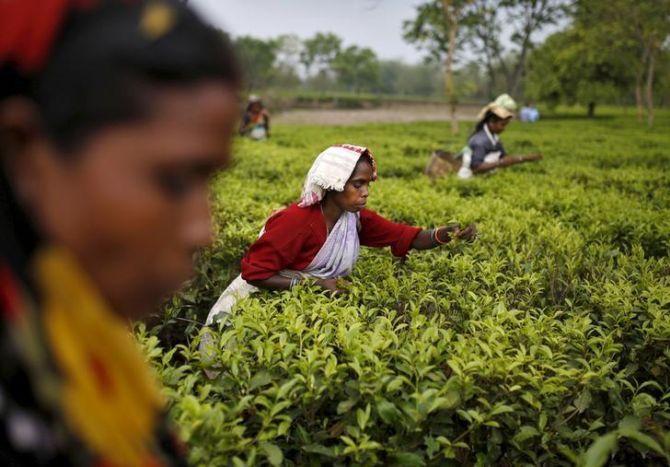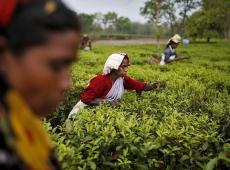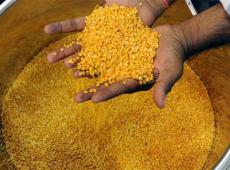Tea Industry Sustainability: Minimum Floor Price Urged
By Rediff Money Desk, Guwahati Aug 14, 2024 18:19
A leading tea planter advocates for a minimum floor price for tea in India, arguing it's crucial for the industry's sustainability and benefits all stakeholders, including producers, buyers, and the government.

Guwahati, Aug 14 (PTI) Fixing a minimum floor price for tea is key to sustaining the industry in India, offering a win-win solution for all stakeholders, including producers, buyers, and the government, a leading tea planter claimed on Wednesday.
He emphasised that the formula for determining the price can be developed through proper consultation.
Speaking at the launch of his book Minimum Floor Price for Tea The Only Way To Make Tea Plantations Sustainable', chairman of Dhunseri Group Chandra Kumar Dhanuka said, "Fixing the floor price will benefit all stakeholders, including small tea growers and workers."
He maintained that it will provide a level playing ground' for tea vis-à-vis other agricultural products for which the government has Minimum Support Price (MSP).
He shared comparative data showing that between 2013-14 and 2022-23, tea prices increased by 33.8 per cent, while items under the Minimum Support Price (MSP) saw much higher hikesjowar by 94 per cent, bajra by 88 per cent, ragi by 67 per cent, paddy by 55 per cent, and wheat by 51 per cent, among others.
"In case of floor price, the government doesn't have to bear any additional burden as it is the industry itself which will adhere to the fixed rates," Dhanuka, who has served as chairman of leading planters' bodies and also the Eastern India region of FICCI, said.
Floor price is the rate below which tea will not be sold at auction or private sales for consumption, with the price to be determined on the basis of cost of production.
Dhanuka emphasised that small tea growers, who produce over 50 per cent of the annual output, along with large estates, are the "true stakeholders." He described brokers, bought leaf factory owners, packet tea owners, and warehouse owners as merely "intermediaries."
"None of the intermediaries is involved with the cost of production. Hence, it is not necessary to involve them in discussions related to minimum floor price; on the contrary, their presence at such meetings may derail the entire discussion," he asserted.
Dhanuka claimed that the small growers stand to benefit the most as they are currently getting an average price of Rs 20 per kg for green leaves, while cost of production comes to over Rs 30 per kg.
"When a minimum rate is fixed over and above the cost of production, it will ensure proper return for their investment," he added.
The Dhunseri Group chairman said the floor price can be fixed after wider consultation, including with the Tea Board, and hoped that the proposals put forth by him in the book will be pursued with the relevant authorities by different tea organisations.
Bijoy Gopal Chakraborty, president of Confederation of Small Tea Growers Association, also present at the book launch, urged the government to include tea in the agriculture sector as it will enable the growers to benefit from government schemes meant for farmers.
Representatives from various small tea grower bodies at the event also advocated for a minimum floor price. Additionally, they called for tea production to be classified under the agriculture sector, rather than being categorised as an industry as it currently is.
He emphasised that the formula for determining the price can be developed through proper consultation.
Speaking at the launch of his book Minimum Floor Price for Tea The Only Way To Make Tea Plantations Sustainable', chairman of Dhunseri Group Chandra Kumar Dhanuka said, "Fixing the floor price will benefit all stakeholders, including small tea growers and workers."
He maintained that it will provide a level playing ground' for tea vis-à-vis other agricultural products for which the government has Minimum Support Price (MSP).
He shared comparative data showing that between 2013-14 and 2022-23, tea prices increased by 33.8 per cent, while items under the Minimum Support Price (MSP) saw much higher hikesjowar by 94 per cent, bajra by 88 per cent, ragi by 67 per cent, paddy by 55 per cent, and wheat by 51 per cent, among others.
"In case of floor price, the government doesn't have to bear any additional burden as it is the industry itself which will adhere to the fixed rates," Dhanuka, who has served as chairman of leading planters' bodies and also the Eastern India region of FICCI, said.
Floor price is the rate below which tea will not be sold at auction or private sales for consumption, with the price to be determined on the basis of cost of production.
Dhanuka emphasised that small tea growers, who produce over 50 per cent of the annual output, along with large estates, are the "true stakeholders." He described brokers, bought leaf factory owners, packet tea owners, and warehouse owners as merely "intermediaries."
"None of the intermediaries is involved with the cost of production. Hence, it is not necessary to involve them in discussions related to minimum floor price; on the contrary, their presence at such meetings may derail the entire discussion," he asserted.
Dhanuka claimed that the small growers stand to benefit the most as they are currently getting an average price of Rs 20 per kg for green leaves, while cost of production comes to over Rs 30 per kg.
"When a minimum rate is fixed over and above the cost of production, it will ensure proper return for their investment," he added.
The Dhunseri Group chairman said the floor price can be fixed after wider consultation, including with the Tea Board, and hoped that the proposals put forth by him in the book will be pursued with the relevant authorities by different tea organisations.
Bijoy Gopal Chakraborty, president of Confederation of Small Tea Growers Association, also present at the book launch, urged the government to include tea in the agriculture sector as it will enable the growers to benefit from government schemes meant for farmers.
Representatives from various small tea grower bodies at the event also advocated for a minimum floor price. Additionally, they called for tea production to be classified under the agriculture sector, rather than being categorised as an industry as it currently is.
Source: PTI
DISCLAIMER - This article is from a syndicated feed. The original source is responsible for accuracy, views & content ownership. Views expressed may not reflect those of rediff.com India Limited.
You May Like To Read
TODAY'S MOST TRADED COMPANIES
- Company Name
- Price
- Volume
- GTL Infrastructure
- 2.74 (+ 2.62)
- 84886833
- Srestha Finvest
- 2.24 (+ 4.67)
- 34707853
- Ola Electric Mobilit
- 132.76 (+ 19.99)
- 27685743
- Suzlon Energy Ltd.
- 79.93 (+ 4.10)
- 27308498
- IFL Enterprises
- 1.22 (+ 4.27)
- 24757806
MORE NEWS

Sebi Eases Compliance for Listed NCDs - New...
Sebi proposes amendments to simplify compliance requirements for entities with listed...

Chandrasekaran: Learn From Indian Wisdom &...
Tata Group Chairman N Chandrasekaran emphasizes the importance of learning from Indian...
JSW Cement Files IPO Papers to Raise Rs 4,000...
JSW Cement has filed draft papers with Sebi for an IPO to raise Rs 4,000 crore. The IPO...












 © 2024 Rediff.com India Limited. All rights reserved.
© 2024 Rediff.com India Limited. All rights reserved.